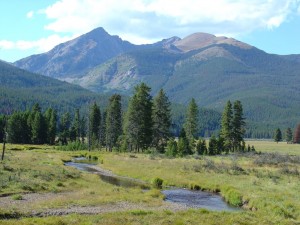The information age has brought Americans closer together in countless ways. Yet the gulf of misunderstanding between east and west may be wider than ever before. The growth of knowledge, information, and instant communication has dramatically increased our access to other points of view. It has also reduced our need to listen. We now tailor our news and entertainment to fit personal interests, no longer watching the same evening news or reading the same papers as everyone else.
That is the great miracle of our time, but it also makes my work harder. I try to help political leaders understand the realities of life in places like Western Colorado: our dependence on water diversions, the multiple uses required on public lands, quaint systems like severed mineral rights and prior appropriation water laws. That has always been a challenge.
I spent a decade on Capitol Hill working for a Colorado Senator, another decade running CLUB 20, 5 years heading the Colorado Department of Natural Resources, and the last few years consulting for foundations, communities, and companies trying to navigate the minefield of environmental law. Some things have remained constant throughout those years.
 The Western Slope has always had to live with a simple reality when it comes to natural resources – we have it, and they want it. Western Colorado has most of the State’s water, energy, minerals, forests, and wildlife, and it generates most of the State’s tourism revenue from skiing, hunting, fishing, hiking, touring, and photography. That is why we often contend with leaders from elsewhere with strong opinions about the Western Slope.
The Western Slope has always had to live with a simple reality when it comes to natural resources – we have it, and they want it. Western Colorado has most of the State’s water, energy, minerals, forests, and wildlife, and it generates most of the State’s tourism revenue from skiing, hunting, fishing, hiking, touring, and photography. That is why we often contend with leaders from elsewhere with strong opinions about the Western Slope.
During a Club 20 trip to DC years ago, I remember a very spirited conversation with a congressional staffer from Rhode Island, whose boss was pushing legislation to designate wilderness areas in Colorado. We had failed miserably to convince him that Rhode Island congressmen should leave Colorado land management decisions to Coloradans. These lands belong to all the people, he rightly pointed out. We had also failed to persuade him that most of the people who live there had a decidedly different view. He maintained that the people who live there are a minority, which is also true. We said the people who lived there knew more about the land and the issues involving it, but that offended him. He said he worked for constituents in Rhode Island, not people in the West, also true. As a last resort, we tried to explain the importance of some of the current activities in the designated areas, activities upon which businesses and communities depended and which the proposed legislation would outlaw. He countered with a glowing description of the area as one of the last great places in America, so I asked the question many Westerners often wonder, “Have you ever even been there?” He had not, but his response is etched in my memory forever: “We don’t have to visit the place to care about it. For many of us,” he said, “it’s enough just to know it’s there.”
For millions of people who live in the American West, it is not enough just to know these great places are there. It is a requirement of life that we use the water and other assets of these lands, because throughout most of the West, including Mesa County, the federal government owns the resources upon which life chiefly depends. The fact that our back yards are also some of the world’s most beautiful places is a happy coincidence to us. It is at once a great blessing, and our everlasting curse. We are blessed to live in an area so special that the rest of the nation cares – sometimes passionately – about how we take care of it.
We always smile at the old saw about why men climb mountains (because they are there). But we cannot afford to make major management decisions regarding public lands and natural resources just because they are there. Such decisions must be based on a solid understanding of the economy, history, culture, and way of life those resources foster. That understanding is sadly lacking among many national leaders.
(A version of this column appeared in the Grand Junction Daily Sentinel on March 6, 2015.)




Comments on this entry are closed.